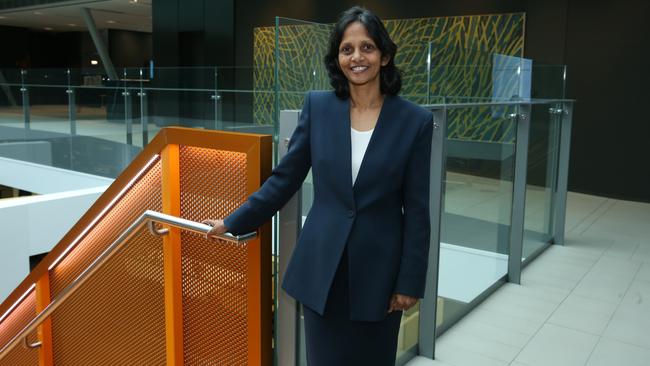Rapid tech change an opportunity: Macquarie CEO
The pandemic has sparked faster technology change than any other period in history, but the challenge is to identify the biggest opportunities, says Macqaurie’s CEO.

Macquarie Group chief executive Shemara Wikramanayake has highlighted rapid digitisation, transitioning to a low-carbon future and the evolution of health and education services as key to the Asia-Pacific region‘s COVID-19 recovery.
Ms Wikramanayake said the pandemic had sparked technology change “at a faster pace” than any other period in history, and the challenge for investors and business was to identify the biggest opportunities and threats in the years ahead.
“Despite immense uncertainty and uneven pace of recovery in different markets, disruption continues to present possibilities for all businesses to reimagine their potential,” she told the Macquarie Australia Conference on Tuesday.
“What we‘ve seen, and indeed what we’re seeing now as we transition out of the other side of these situations is an emergence of real opportunity.”
Ms Wikramanayake was opening the annual Macquarie Australia Conference — held online this year — which has more than 1000 attendees globally. More than 100 Australian and New Zealand companies are involved in 2021.
Ms Wikramanayake expressed optimism the global rebound in economic activity in 2021 was gathering pace, and said Australia was well positioned to continue to grow strongly despite a slow start to the vaccine rollout.
“Following one of the largest economic shocks since the 1930s the global economic recovery is now well under way, with GDP (gross domestic product) likely to expand by a rapid 5.5 per cent over the course of this year,” she said.
“In general, the countries that have controlled the virus the best have seen the strongest recoveries, with China and Australia outperforming over last year.
“The US is likely to lead the way in 2021 as the fiscal stimulus and the rapid vaccine rollout allow reopening. But Australia is still expecting to this year outperform most other economies.”
The Morrison government is laying the groundwork for a spending blitz in next week’s federal budget in an attempt to get unemployment below 5 per cent and maintain economic growth.
Ms Wikramanayake said despite some lingering risks from the pandemic to the nation’s economic rebound, ongoing monetary and fiscal support had driven employment levels beyond pre-COVID levels and economic output was likely to reach new highs.
“Investment is occurring across sectors, including areas of traditional strength such as infrastructure and commodities,” she added.
“While our vaccine rollout has started slowly, very low rates of COVID infection have allowed much of the economy to return to what’s normal. As the program picks up pace, the success of the mass inoculation programs in places like Israel suggest that we will be able to further normalise as the year progresses and eventually reopen our borders.”
Ms Wikramanayake said Macquarie was seeing opportunities emerge from COVID-19 in areas including digital infrastructure, such as data centres and logistics, as well as the digitisation of consumer services. She also pointed to the growth of telehealth services and the uptake of digitised records as underpinning change in the health sector.
On climate change, Ms Wikramanayake said the transition to lower emissions was “one of the most complex and critical challenges” facing the world and required a strong partnership between public and private sectors for progress.
Ms Wikramanayake said Macquarie was engaging with investors and businesses to plot “granular action” across specific assets to repurpose and upgrade them to help facilitate lower emissions. She highlighted technologies enabling the achievement of more ambitious emission targets, such as carbon capture and storage, batteries and hydrogen, and a transition to low-emissions transport.
Macquarie reports its full-year earnings on Friday, and analysts expect the asset management and investment giant to post net profit of $2.85bn for the 12 months to March 31. That would be up from $2.73bn in the previous year.
In February, Macquarie upgraded its profit guidance, largely on the back of a strong performance from its US gas trading unit.
At the time the group said it expected earnings to print 5 to 10 per cent higher in 2021 than the previous year.
At the top end of that range — a $3bn annual profit result — Macquarie would book a record year.
The stock edged up almost 0.1 per cent to $160.28 on Tuesday.




To join the conversation, please log in. Don't have an account? Register
Join the conversation, you are commenting as Logout